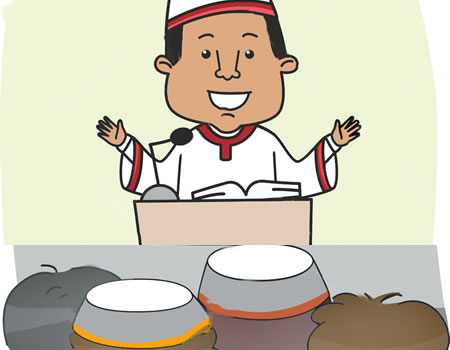IT is important for Muslims to realise that da’wah is an obligation upon them. Allah (SWT) says in the Qur’an:
“Invite to the way of your Lord with wisdom and fair preaching and argue with them in a way that is better. Truly, your Lord knows best who has gone astray from His path, and He is best aware of those who are guided.” (Q16:125)
The Prophet (P.B.U.H) has also said: “Convey from me even one verse.” (Al-Bukhari)
Conveying the message, therefore, does not require a high level of scholarship; it is, in fact, a responsibility of every Muslim, according to their ability.
The obligation is further emphasised by the following verse which explains that not conveying the message – hiding one’s knowledge of Islam – is disobedience to Allah.
“Verily, those who conceal the clear proofs, evidence and the guidance, which we have sent down, after we have made it clear for the people in the Book, they are the ones cursed by Allah and cursed by the cursers.” (Q2:159)
The Prophet (SAW) also stated: “Whoever hides knowledge, Allah will brand him with the branding iron from the Hellfire” (Ahmed).
Calling people to Allah also means completing our worship, the reason for which we were created. It is one of the noblest acts that attract high rewards.
“And who is better in speech than he who invites to Allah and does righteous deeds, and says; ‘I am one of the Muslims.’” (Q41: 33)
Da’wah is an Arabic word which takes its root from da’a (to call). It has a series of interpretations in the religious and secular ramifications. In Islamic terminology, da’wah immediately implies invitation to the way of Allah.
Indeed, Muslims are very fortunate that Allah has guided us to the right path. It is imperative that we invite people to Islam as a way to show our gratitude to Almighty Allah. We should propagate Islam based on the Qur’an and Sunnah, purely for Allah’s pleasure. The reason is to call people to tahwid. We must propagate Islam in order to let the laws of Allah prevail, instead of man-made laws. It is imperative that we do da’wah in order to revive the Sunnah of the Prophet and gain more rewards.
Da’wah is essentially a divine statement which the Creator has placed in the hands of his prophets and their successors (the ulama) so that His main objective of creating mankind would be accomplished. Since, from the perspective of Islam, Allah is the law giver, He has absolute authority over His creatures. The objectives of da’wah are, therefore, to direct people to live a life that agrees with the plan of the Creator.
Allah, in the Glorious Qur’an, orders his Prophet (P.B.U.H) to cling to the use of wisdom in calling the people.
“Invite (mankind) O Muhammad (SAW) to the way of your Lord with wisdom and fair preaching, and argue with them in a way that is better. Truly your Lord knows best who has gone astray from His path and He is best knower of those who are guided.” (Q16:125)
May the immeasurable and countless pleasure of Allah be upon the Noble Prophet Muhammad (SAW) who said: “Convey (to others) from me even if it is a single verse.”
Forms of da’wah
There are various forms of da’wah, which range from specific to general. The specific forms are those relating to the basic teachings of Islam as the various modes of worship. The general forms are those relating to modern approach to invitation and teaching of Islam using modern technology. These forms of da’wah are very important if the concept is to be understood from a wider perspective. This probably explains why the option is kept open in the Qur’an.
As for the specific forms of da’wah, the following readily approach our minds: wa’z, irshad, tadhkirah and nasiha. Dhikr, nasihah, wa’z are related to Muslims, while for non-Muslims, tabliqh and tabshir are appropriate for da’wah. All these terms are integral parts of da’wah. They are carried out in enclosure of the mosque, Muslim festivals and programmes.
For the general forms, we have example such as open air, mass media, use of dialogue, video, drama, etc.
Open air: This is an individual effort aimed at inviting people to the way of Allah. The major objective is to invite people to Islam and also convince the audience that shirk is the greatest crime in Islam. Open-air preaching is the early traditional mode of disseminating the message of Islam, which was used by the prophets of Allah, companions and itinerant scholars. It was one of the factors which contributed to the spread and consolidation of Islam.
Mass media: Mass media has been described as all of the communications media that reach a large audience, especially television, radio, newspapers and the internet. Such media facilitate the transmission of education, enlightenment information and entertainment to the people.
Video and drama: Nowadays, video compact discs and drama are becoming a very good source of disseminating message to the public. Our interest in this regard is the surge in video CDs in the market today with a powerful influence on the socio-cultural attitude of the people, especially the youth. An Islamic drama has the potential of refocusing the attention of Muslims and to correct the erroneous messages brought by non-Muslims who are in the majority in this sector of the entertainment industry. Although some Sunnah practitioners frown at drama, it has ways of propagating Islam.
Etiquette of a da’i (propagator)
Indeed, the Islamic ethics are explained by Almighty Allah in the Glorious Qur’an, exemplified by the Noble Prophet (P.B.U.H) and followed by the companions. It is necessary for an Islamic propagator to adopt some specific ethics in order to be successful in his field. These are some of the ethics or characteristics of da’i.
Faithfulness and sincerity: It is incumbent upon an Islamic propagator to be sincere in his words and actions. He must propagate the truth.
Patience: If patience is one of the prominent virtues required of all mankind so that they may be successful in all their endeavours, then it is more necessary for a da’i than others.
Humility: Arrogance is nothing but ignorance, stupidity and proof that a person does not know their worth. Pride belongs to Allah alone. A propagator needs to be humble because he associates with people, invites them to the straight path and teaches them Islamic ethics.
Good relations: The very nature of da’wah requires associating with people. Prophet Muhammad (SAW) spent his life relating with people, joining their gatherings and attending their festivals, calling them to the path of Allah, commanding good deeds and thinning evil. Relationship with people is vital on the field of da’wah because Islam cannot be fully practised alone – without associating with others. People are collective in nature and cannot live alone.
Faithfulness: A propagator’s faith should be unshakable, no matter how much distress he encounters, the strength and the resistance of unbelievers or adversaries. The faith of the propagator should not become frail due to the inattentiveness of the people.
Mercy: Propagators have to be merciful in all affairs of da’wah and those invited as well. He has to be cognizant always that he is inviting mankind to what Allah loves. As a Muslim, one has to be gentle, compassionate and affectionate to others.
Fear of God: A propagator should allow the presence of Allah in his mind always. As long as propagators continue assisting Allah, calling to His path, Allah will help them.
The task of da’wah is enormous and complex but important and essential. It should be emphasised that da’wah is an art which should be mastered before being embarked upon. There is no immediate solution to large-scale problems. In order to be taken seriously, those who propagate Islam should live according to the principles of Islam.
Da’wah workers should first and foremost endeavour to attain piety, sustain and strengthen it. It is an indispensable instrument that enables them to achieve their target as well as taqwa and al-iklas.
Knowledge is a vital instrument of da’wah. Da’wah workers should seek knowledge and, in fact, make this a life-long endeavour. Islam is based on knowledge hence inviting people to the religion must also be based on knowledge.
Knowledge of the method of da’wah is as important as knowledge of the subject matter. Poor knowledge of the method of da’wah is detrimental to the work of da’wah.
- Miss Shomope presented this paper at one of the events that marked the graduation ceremony of Iqra College, Ilorin, recently.
WATCH TOP VIDEOS FROM NIGERIAN TRIBUNE TV
- Relationship Hangout: Public vs Private Proposals – Which Truly Wins in Love?
- “No” Is a Complete Sentence: Why You Should Stop Feeling Guilty
- Relationship Hangout: Friendship Talk 2025 – How to Be a Good Friend & Big Questions on Friendship
- Police Overpower Armed Robbers in Ibadan After Fierce Struggle






